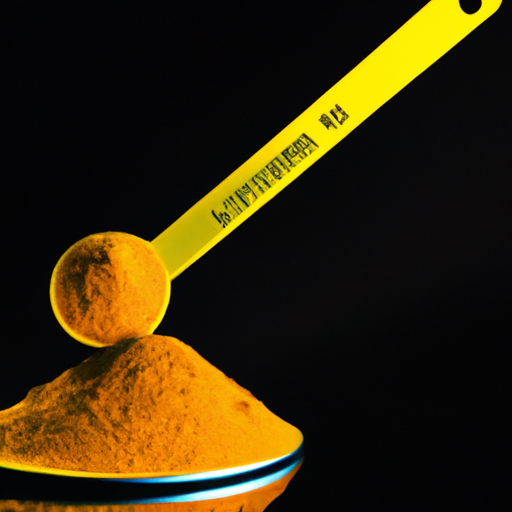Being health-conscious, I constantly seek out natural remedies to enhance my immune system and maintain wellness. Lately, I have been adding turmeric powder to my diet as a key ingredient.
This bright yellow spice has been used in Indian and Chinese medicine for centuries and has gained popularity in recent years for its numerous health benefits. The vibrant color of turmeric powder is not the only thing that sets it apart from other spices.
It contains a powerful compound called curcumin, which has anti-inflammatory and antioxidant properties. Research suggests that turmeric powder may help alleviate symptoms of various health conditions, including arthritis, depression, and even cancer. However, like with any supplement or dietary change, it is essential to understand the recommended daily intake of turmeric powder and the potential risks and side effects associated with its consumption.
Key Takeaways
- There are no specific guidelines for daily intake of turmeric powder through cooking, but general recommendation for supplements is 500-2,000mg per day.
- Curcumin, the powerful compound in turmeric powder, is not easily absorbed by the body and should be consumed with black pepper or fat.
- The recommended daily dose for adults is 1-3g/day, but tolerance and optimal dosage varies from person to person.
- Overconsumption of turmeric powder may lead to toxicity and potential health risks, and precautions and contraindications should be considered before regular consumption.
What is Turmeric Powder?
You may be wondering, "What’s turmeric powder?"Well, it’s a vibrant yellow spice commonly used in Indian and Middle Eastern cuisine for its rich flavor and potential health benefits.
Turmeric powder comes from the root of the turmeric plant, native to India and Southeast Asia. The root is boiled, dried, and ground into a fine powder, which can then be used in cooking or as a supplement.
Turmeric powder uses are diverse, and it’s easy to make at home if you have access to fresh turmeric root. Simply boil the root until it’s soft, let it cool, and then peel the skin off. Next, grate the root into a fine powder using a grater or food processor.
Spread the grated turmeric out on a baking sheet and let it dry in the sun or in a low-temperature oven. Once the turmeric is completely dry, grind it into a fine powder using a spice grinder or mortar and pestle.
Now that you know what turmeric powder is and how to make it, let’s explore its potential health benefits.
Health Benefits of Turmeric Powder
When adding a dash of turmeric to your meals, it’s like adding a burst of sunshine to your health. Turmeric powder is a spice that has been used for centuries in traditional medicine due to its anti-inflammatory and antioxidant properties. Today, turmeric powder is gaining popularity as a natural supplement for various health benefits.
Here are some of the health benefits of turmeric powder:
- Turmeric powder has been linked to weight loss by increasing metabolism and reducing inflammation in fat cells.
- Turmeric powder may improve skin health by reducing inflammation and oxidative stress. This can lead to a brighter, clearer complexion.
- Turmeric powder may also have anti-cancer properties, reduce the risk of heart disease, and improve brain function.
As we explore the benefits of turmeric powder, it’s important to note that the recommended daily intake varies depending on the individual’s needs. Let’s take a closer look at the appropriate amount of turmeric powder to consume daily.
Recommended Daily Intake of Turmeric Powder
It’s important to note the recommended daily intake of turmeric powder may vary depending on your individual needs. For those looking to take turmeric supplements, the general recommendation is 500-2,000 milligrams per day. However, it’s important to consult with a healthcare professional before beginning any supplement regimen to determine the appropriate dosage for your specific health needs.
For those who prefer to incorporate turmeric into their diet through cooking, there are no specific guidelines for daily intake. Generally speaking, adding a teaspoon of turmeric powder to your daily meals can provide a range of health benefits. It’s important to note that the active compound in turmeric, known as curcumin, is not easily absorbed by the body. To improve absorption, it’s recommended to consume turmeric with black pepper or a source of fat.
To incorporate turmeric powder into your diet, there are a variety of ways to do so. One option is to add it to soups, stews, or curries for an added flavor and health boost. Another option is to make a turmeric latte with almond milk, honey, and cinnamon. The possibilities are endless, and with a bit of creativity, you can easily add this superfood to your daily diet.
How to Incorporate Turmeric Powder into Your Diet
Spice up your meals with a dash of golden goodness and add a healthy twist to your diet by incorporating turmeric in creative ways. Turmeric powder can be used in a variety of dishes, including soups, stews, curries, and even scrambled eggs. For those who are not familiar with the taste, start with a small amount and gradually increase the quantity.
One popular way to consume turmeric powder is by making turmeric milk, which is a blend of milk, turmeric powder, honey, and spices like cinnamon and ginger. Another option is to add turmeric powder to your smoothies, along with fruits and vegetables of your choice. Here is a table with some creative ways to incorporate turmeric powder into your diet:
| Dish | Turmeric Powder Amount | How to Prepare |
|---|---|---|
| Scrambled Eggs | 1/4 tsp | Add to beaten eggs before cooking |
| Golden Milk | 1 tsp | Mix with warm milk, honey, and spices |
| Turmeric Tea | 1/2 tsp | Steep in hot water with lemon and honey |
| Roasted Vegetables | 1/2 tsp | Toss with vegetables and olive oil before roasting |
| Turmeric Smoothie | 1 tsp | Blend with fruits, vegetables, and milk or yogurt |
Incorporating turmeric into your diet can provide various health benefits, but it is important to be aware of the potential risks and side effects. Let’s take a closer look at these in the following section.
Risks and Side Effects of Turmeric Powder
As I’m exploring the benefits of turmeric powder in my diet, it’s important to consider potential risks and side effects.
One concern is possible interactions with medications, which could cause adverse effects or reduce drug effectiveness.
Additionally, some people may experience allergic reactions to turmeric, and overconsumption could lead to toxicity.
It’s crucial to be aware of these risks and speak with a healthcare provider before significantly increasing turmeric intake.
Interactions with Medications
If you’re taking medications, you need to be cautious about the amount of turmeric powder you consume daily, as it may interact with certain drugs and cause adverse effects. Turmeric powder contains curcumin, which can affect how the body metabolizes certain medications.
For example, it may increase the effects of some blood thinners, such as warfarin, leading to bleeding or other complications. It may also interact with drugs used to lower blood sugar levels, such as diabetes medications, and cause hypoglycemia.
Other medications that may interact with turmeric powder include anti-inflammatory drugs, such as aspirin and ibuprofen, and certain chemotherapy drugs.
It’s important to talk to your healthcare provider before taking turmeric powder if you’re on any medications. They can advise you on the safe amount to take and any potential dangers to watch out for.
With that being said, let’s move on to the next subtopic about allergic reactions.
Allergic Reactions
You may experience severe allergic reactions from consuming turmeric, so it’s important to be cautious when incorporating it into your diet. Some common symptoms of an allergic reaction to turmeric powder include itching, swelling, difficulty breathing, and hives. If you experience any of these symptoms, it’s important to seek medical attention immediately.
It’s also important to note that the tolerance for turmeric powder dose can vary from person to person. Some people may be able to tolerate higher doses of turmeric powder without experiencing any adverse effects, while others may experience side effects even at lower doses. To help you better understand how much turmeric powder you can safely consume, the following table provides an overview of the recommended daily doses based on your weight and tolerance level.
| Weight | Low Tolerance | Moderate Tolerance | High Tolerance |
|---|---|---|---|
| 50 kg | 0.5 tsp | 1 tsp | 1.5 tsp |
| 70 kg | 0.75 tsp | 1.5 tsp | 2.25 tsp |
| 90 kg | 1 tsp | 2 tsp | 3 tsp |
| 100 kg | 1.25 tsp | 2.5 tsp | 3.75 tsp |
| 120 kg | 1.5 tsp | 3 tsp | 4.5 tsp |
It’s important to remember that these doses are general guidelines and that individual tolerance levels can vary. Be sure to speak with your healthcare provider before incorporating turmeric powder into your diet, especially if you have a history of allergic reactions or are taking any medications. In the next section, we will discuss the potential risks of overconsumption and toxicity.
Overconsumption and Toxicity
Beware of overindulging in turmeric, as consuming excessive amounts can lead to toxicity and potential health risks. While turmeric is generally safe when consumed in appropriate amounts, consuming too much can cause toxicity concerns and potential side effects.
The active ingredient in turmeric, curcumin, can interfere with the absorption of certain medications and may also cause gastrointestinal issues such as nausea, diarrhea, and stomach upset. In addition, consuming large amounts of turmeric may also cause liver damage and increase the risk of bleeding.
Therefore, it’s important to consume turmeric in moderation and to consult with a healthcare provider before taking turmeric supplements or using it to treat any health condition. With proper precautions and contraindications, turmeric can be a beneficial addition to one’s diet and overall health regimen.
Precautions and Contraindications
Considering the potential risks, it’s important to consult with a healthcare professional before regularly consuming turmeric powder. While turmeric is generally safe for most people when taken in recommended doses, there are some precautions and contraindications that should be taken into consideration. For instance, turmeric may interact with certain medications, such as blood thinners, and may cause stomach upset or allergic reactions in some individuals. Additionally, high doses of turmeric over a prolonged period of time may lead to liver and kidney damage.
To better understand the risks and benefits of turmeric, it’s important to be aware of the dosage and quality control measures. The table below provides a summary of the recommended daily dose of turmeric for adults, as well as some precautions and storage recommendations.
| Dosage | Precautions | Storage Recommendations |
|---|---|---|
| 1-3 | Consult with healthcare professional before use | Store in airtight container in cool, dry place |
| grams/day | Do not use if pregnant or breastfeeding | Keep away from direct sunlight |
| Do not use if allergic to turmeric or its components |
By following these guidelines and consulting with a healthcare professional, you can safely incorporate turmeric into your diet. In the next section, we will explore the scientific evidence and research findings regarding the potential health benefits of turmeric.
Scientific Evidence and Research
I want to talk about the scientific evidence and research surrounding turmeric powder. Specifically, I’ll focus on clinical trials and studies, as well as current research findings.
It’s important to stay up-to-date on the latest findings, as new research can shed light on the potential benefits (and risks) of consuming turmeric powder. By examining the scientific evidence, we can make informed decisions about whether or not to incorporate this spice into our diets.
Clinical Trials and Studies
Research suggests that consuming 1 to 3 teaspoons of turmeric powder per day may have potential health benefits, according to clinical trials and studies. Turmeric supplementation has been found to be effective in reducing inflammation, improving brain function, and potentially reducing the risk of chronic diseases such as cancer and heart disease.
However, it’s important to note that consuming high doses of turmeric may also have potential side effects such as gastrointestinal issues and increased risk of bleeding. To ensure the safe and effective use of turmeric, it’s recommended to consult with a healthcare professional before incorporating it into your daily routine.
Additionally, it’s important to choose a high-quality turmeric supplement and to follow the recommended dosage guidelines. Overall, current research findings suggest that moderate consumption of turmeric powder may provide potential health benefits, but it’s important to be mindful of the potential risks associated with high doses.
Moving forward, let’s explore the latest research findings on the potential benefits of turmeric consumption.
Current Research Findings
Recent studies have shown that regular consumption of curcumin, the active ingredient in turmeric, may increase antioxidant capacity in the body by up to 300%. This is because curcumin has strong anti-inflammatory and antioxidant properties that help protect against cellular damage caused by free radicals. In addition, curcumin has been found to have potential anti-cancer effects and may improve brain function and reduce the risk of heart disease.
If you are considering taking turmeric supplements, it is important to note that the optimal turmeric dosage has not been definitively established. However, most studies have used doses ranging from 500mg to 2,000mg of curcumin per day. It is also important to choose a high-quality turmeric supplement that contains a standardized amount of curcumin. As with any supplement, it is recommended to consult with a healthcare provider before starting to take turmeric.
Moving on to the next section, there are alternative uses of turmeric powder that you may find interesting.
Alternative Uses of Turmeric Powder
As someone who frequently uses turmeric powder, I’ve learned the importance of properly storing and choosing high-quality turmeric.
When it comes to storage, it’s best to keep turmeric powder in an airtight container away from light and heat.
When choosing turmeric powder, look for brands that are organic and free from additives or fillers.
It’s also important to know the shelf life of turmeric powder, which can last up to two years if stored properly.
How to Store Turmeric Powder
To keep your turmeric powder fresh and flavorful, proper storage is essential. The best way to store turmeric powder is in an airtight container in a cool, dark place. This will help to prevent moisture, light, and air from degrading the quality of the powder.
Turmeric powder has a relatively long shelf life of up to two years if stored correctly. One important consideration when storing turmeric powder is to avoid exposing it to heat and light. These factors can cause oxidation and degradation of the powder, leading to a loss of flavor and potency.
Additionally, moisture can also lead to clumping and spoilage of the powder. By following these storage guidelines, you can ensure that your turmeric powder stays fresh and flavorful for a long time. Speaking of freshness, let’s discuss how to choose quality turmeric powder.
How to Choose Quality Turmeric Powder
Choosing quality turmeric powder is essential for getting the best flavor and health benefits from this versatile spice. When buying turmeric powder, it’s important to choose organic and non-GMO options. This ensures that the turmeric was grown without harmful pesticides or genetic modification, which can affect both the taste and quality of the powder.
In addition to choosing organic and non-GMO turmeric powder, selecting the best turmeric powder brands can also make a difference. Look for brands that prioritize quality and sustainability in their sourcing and production processes. Some top turmeric powder brands include Simply Organic, Frontier Co-op, and Starwest Botanicals.
By choosing high-quality turmeric powder, you can ensure that you are getting the best possible flavor and health benefits from this amazing spice. When it comes to getting the most out of your turmeric powder, it’s important to not only choose a quality product but also to store it properly.
So, how long does turmeric powder last? Let’s take a closer look.
How Long Does Turmeric Powder Last?
Wondering how long your turmeric powder will last? Turmeric powder shelf life can vary depending on how it is stored. Generally, turmeric powder can last for up to two years if stored properly. However, if not stored correctly, the shelf life can be significantly shorter.
To ensure your turmeric powder lasts as long as possible, it is important to store it in a cool, dark, and dry place. Exposure to light, heat, and moisture can cause the powder to lose its flavor and potency. It is also recommended to store turmeric powder in an airtight container to prevent air from entering and causing the powder to clump. By following these storage tips, you can extend the shelf life of your turmeric powder and enjoy its health benefits for longer.
| Storage Method | Shelf Life |
|---|---|
| In a cool, dark, and dry place | Up to 2 years |
| Exposed to light, heat, and moisture | Significantly shorter |
| Stored in an airtight container | Extends shelf life |
Overall, it is important to store your turmeric powder correctly to ensure it lasts as long as possible. By following proper storage techniques, you can enjoy the health benefits of turmeric powder for years to come.
Frequently Asked Questions
Can turmeric powder be used topically for skin care?
Yes, turmeric powder can be used topically for skin care. It has been shown to have anti-inflammatory and antioxidant properties, which can help with acne, dark spots, and wrinkles. Application methods include making a paste with water or oil and applying directly to the skin.
Can turmeric powder be used as a natural food coloring?
Oh sure, because when I think of a natural food coloring, my mind immediately goes to turmeric powder. But in all seriousness, turmeric powder has been used for centuries for its health benefits and can add a vibrant yellow hue to dishes. Give it a try!
Is it safe to consume turmeric powder while pregnant or breastfeeding?
As an AI language model, I am not qualified to provide medical advice. However, it is important to consult with a healthcare provider before consuming turmeric powder during pregnancy or breastfeeding. There is limited research on the safety of turmeric powder in these circumstances.
Can turmeric powder interact with certain medications?
Interactions and dosage are important considerations when taking turmeric powder. While there are potential benefits, such as anti-inflammatory properties, there are also risks of interactions with certain medications. It is important to consult with a healthcare provider before use.
Is it okay to consume turmeric powder on an empty stomach?
Consuming turmeric powder on an empty stomach may have various benefits, including improved digestion and reduced inflammation. However, excessive consumption may lead to stomach discomfort. Recommended dosage is 1-3 grams per day, preferably with meals.
Conclusion
So, how much turmeric powder should you consume each day? The recommended daily intake is up to 1 teaspoon, which is equivalent to about 4 grams. However, it’s important to remember that turmeric powder shouldn’t be used as a substitute for medical advice or treatment.
While there are numerous health benefits associated with turmeric powder, it’s important to be aware of the risks and side effects. Some people may experience stomach upset, nausea, or allergic reactions. Additionally, turmeric may interact with certain medications, so it’s important to speak with your healthcare provider before taking any supplements.
In conclusion, incorporating turmeric powder into your diet can provide numerous health benefits, but it should be done in moderation and with caution. By understanding the recommended daily intake, potential risks, and scientific evidence, you can make an informed decision about whether turmeric powder is right for you. Remember to always consult with your healthcare provider before adding any supplements to your daily routine.










